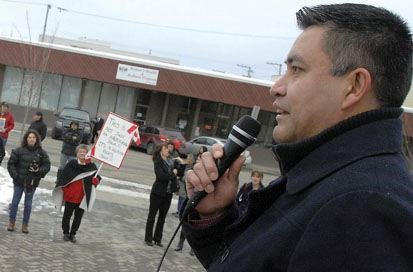For the third time in less than a year, the Carrier Sekani Tribal Council's chief called on School District 57 to bring local First Nations into its education decisions.
And this time, Terry Teegee put trustees on notice that lawyers could be involved.
Teegee said the board has failed to move forward after it "arbitrarily dissolved" an Aboriginal Education Board in 2014.
"I am fed up. This has been going on since 2014," said Teegee, who said he received a letter but hasn't met with the board after his last presentation in April.
"Nothing substantial has happened. The Truth and Reconciliation Commission stated education is one of the first recommendations to address."
But later in the meeting trustees on the 2014 board disputed that characterization, saying it had been dissolved due to nonattendance.
Brenda Hooker said a new committee was created after "extensive consultation" with the ministry, aboriginal education department and local groups as to how to deal with a board that was "not fulfilling the terms of their reference."
Hooker, with Bruce Wiebe and Trish Bella, spoke against a recommendation before the board to send a policy change out for consultation.
It essentially notifies groups of the word change from "board" to the current "committee."
"This change here is reflecting what is being done now in the district... I'm not sure what you're asking them to consult on when we already have the committee in place," Hooker said. "We've moved on to a more effective manner in addressing the needs of our aboriginal students."
But Sharel Warrington, who was also on that former board, said it's a public issue that should go to the community.
"It may be well argued that this is not a major change to the policy... but there are other factors that we are all aware of that we probably as a responsible group of trustees who are here to represent every voice, should consider."
In the end, chair Tony Cable broke the tie in favour of the recommendation, which said the updates were necessary "to clarify the relationship" between the board and the district's local aboriginal communities.
Teegee said he had not been consulted on the change before the board.
"It's not very inclusive, it's more exclusive in terms of our involvement," said Teegee, adding it isn't clear to him who will sit on that committee and how those representatives will be selected.
Teegee told the board it would likely hear from the organization's legal counsel, but later said it would be a last resort.
"We're leaving every door open including legal action but before it comes to that we have to exhaust every avenue before we take legal action."
He also presented a resolution from the Union of British Columbia Indian Chiefs calling for the reinstatement of the Aboriginal Education Board.
Harris, chair of the policy committee, said the approach was necessary "in the interest of openness and transparency, (to) give people an opportunity to have their say."
Harris praised the work of the Aboriginal Education department, as did other trustees, pointing to increases in the aboriginal graduation rates over the years. Last year 60.5 per cent of aboriginal students graduated, up from the 48 per cent the year before.
That's still behind the provincial average of 63 per cent for aboriginal learners, and well behind the 86 per cent of non-aboriginal students who graduated last year.


